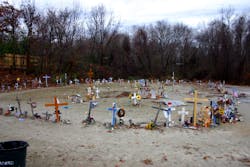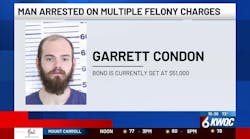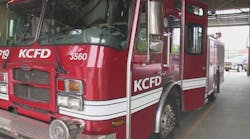PROVIDENCE, R.I. — In 2003, John Bernardo worked occasional nights as a DJ in bars throughout the state, hired to bring in people who wanted to dance and buy drinks.
After Feb. 20, 2003, the night 100 people — including two of his friends — were killed and more than 200 injured, many severely, in the Station nightclub fire in West Warwick, that all changed.
"The business really dropped off after that," he said. "Entertainment nights at bars and grills, they said, 'It ain't worth it.'"
For a DJ that was bad news, but from the perspective of his day job as an electrical safety engineer, he said it was a long time coming.
Today, Bernardo is the president of the Safety Association of Rhode Island and the owner of his own building-safety consulting company. He said the changes in the state's fire code enacted after the Station tragedy turned Rhode Island's fire safety rules from arcane and confusing to a modern code that was more easily understood and enforced.
The code met, and in places exceeded, the standards of the National Fire Prevention Association. It added new rules requiring sprinklers and alarms and limiting occupancy capacity in places of public entertainment. It mandated more frequent inspections and that training be provided for, and done by, fire marshals and other inspectors.
Safety officials and business operators say the biggest change after the Station fire was elimination of what was called the "grandfather" clause.
Before the Station fire, Rhode Island's fire code had been left to evolve in fits and starts. W. Keith Burlingame, executive director of the Rhode Island Fire Safety Code Board of Appeal and Review, said that before 2004 it was a legislative code, meaning the General Assembly enacted and amended it.
But even when new standards were enacted, they applied only to buildings built after that change took effect.
"If you were in compliance with the code in effect when you built," he said, "you were OK."
That a meant a building built in the 1970s but in continuous use needed only to comply with the code in force in the 1970s. It made enforcement difficult, Burlingame said, because it meant fire marshals had to figure out what rules were in effect in what years before they could cite a potential violation.
So even when the pre-Station code was updated, it had little effect, in terms of the total number of buildings in the state.
"The biggest elephant in the room was grandfathering," Burlingame said.
When the new code took effect in 2004, Burlingame said, overnight nearly every building in the state needed to be brought up to code.
And there were complaints.
The new standards mandated sprinklers in all places that held 150 or more people. Sprinklers were no small job, they usually require their own water line and cost thousands of dollars.
Some changes were made in the following years, such as easing standards on churches and three-family houses, which are considered tenements in other states' codes. The state is in the process of reviewing how adopting the 2015 National Fire Protection Association code would affect building costs.
John Elkhay, a Providence restaurateur who has opened restaurants before and after the Station fire, said the post-Station code, and the inspections and reviews it entails, can add six months or a year to a project, especially if the business owner isn't familiar with it.
The owners of Lombardi's 1025 in Johnston, an iconic dining hall that hosted political fundraisers, sports-team awards nights and father-daughter dances, closed, citing the costs of the new code.
But Elkhay said that, generally, the list of the Station fire's casualties tended to shut down most arguments.
"When you lose 100 people," said Elkhay, "that's a big deal."
———
©2018 The Providence Journal (Providence, R.I.)
Visit The Providence Journal (Providence, R.I.) at www.projo.com
Distributed by Tribune Content Agency, LLC.






